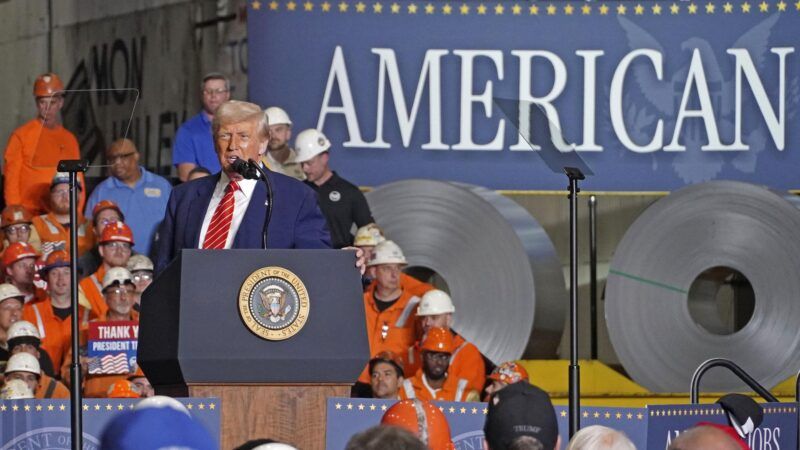Trump's Controlling Stake in U.S. Steel Is Indefensible Socialist Nonsense
Any decisions made by U.S. Steel's executives and shareholders will require approval from Trump, his appointees, or his successors.

U.S. Steel isn't just getting nationalized. It's getting…personalized?
President Donald Trump will personally control the so-called "golden share" that his administration has forced U.S. Steel to accept as part of the terms of a deal that will see the previously private company get acquired by Japan-based Nippon Steel. It's an utterly absurd arrangement—one that will leave the federal government with a controlling share of U.S. Steel even after Trump leaves office—that gives Trump the power to block future attempts by U.S. Steel to relocate its headquarters or make changes to its production facilities.
Documents filed this week with the Securities and Exchange Commission (SEC) spell out the specifics of the deal. Trump must provide "written consent" before U.S. Steel will be allowed to change its name, relocate its headquarters, reduce or alter any planned capital investments, "close, idle, or sell" its existing plants, or attempt to acquire any part of a competing business.
In short: Whatever decisions are made by U.S. Steel's executives and shareholders (or by Nippon, which will own U.S. Steel) will require approval from Trump, his appointees, or his successors.
The terms spelled out in the SEC documents extend well beyond government meddling in the future of a private business. The deal also means that the same federal government charged with regulating other steel companies operating in the United States now owns a controlling share in a direct competitor. That's a massive conflict of interest, on top of the other gross implications here.
This is socialism of the particularly stupid variety, like something ripped from the pages of Atlas Shrugged.
No surprise, then, that The New Republic is a fan: "This leftish maneuver—one might even call it socialist—represents a promising new experiment in regulatory policy," writes Timothy Noah. As he points out, the idea of using these "golden shares" to effectively take over private business has gained some traction on the political left in recent years. The Roosevelt Institute, for example, has advocated for using them to force car companies to build more electric vehicles and to artificially hike wages.
The Trump administration's handling of the U.S. Steel/Nippon deal will only open the door to more arrangements like this—giving future presidents a precedent for forcing their way into the board rooms of private companies.
For anyone to the right of hardened socialists, this arrangement should be completely indefensible. That being said, I do look forward with a sort of grim amusement to the rhetorical gymnastics that many Republicans will no doubt deploy to not only defend this deal but to insist that Trump's takeover of U.S. Steel is actually a brilliant exercise of executive power.
When that happens—and it will—keep in mind how conservatives and Republicans reacted to the Obama administration's partial takeover of General Motors a decade ago. "If congressional Republicans do not object to this arrangement, the GOP position is simple," writes Jim Geraghty at National Review. "The U.S. government owning shares in private companies and directing a company's decisions is socialism, communism, economic foolishness, and arguably a form of economic fascism. But that's only when a Democratic president does it. When a Republican president does it, it's perfectly fine."
Trump's takeover of U.S. Steel is socialist nonsense that violates every principle of limited government and represents an unrestrained view of executive power. It should be universally opposed by Congress and the public, and it ought to be reversed as soon as possible.


Show Comments (74)